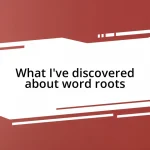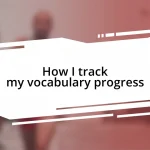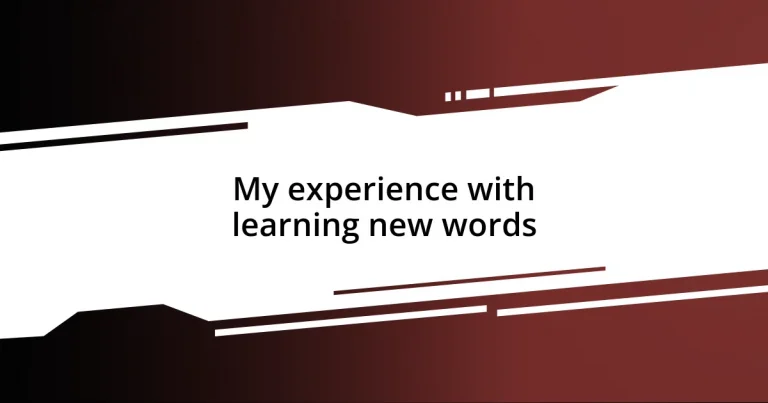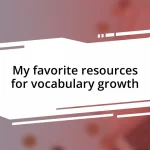Key takeaways:
- Vocabulary growth enhances communication and emotional expression, turning new words into valuable connections.
- Effective learning methods include reading widely, maintaining a personal journal, and engaging in conversations to reinforce new vocabulary.
- Daily practices like spaced repetition, labeling items, and incorporating new words into writing can significantly aid retention.
- Challenges such as information overload, inconsistent practice, and the fear of misuse are part of the learning process and can be overcome with perseverance.
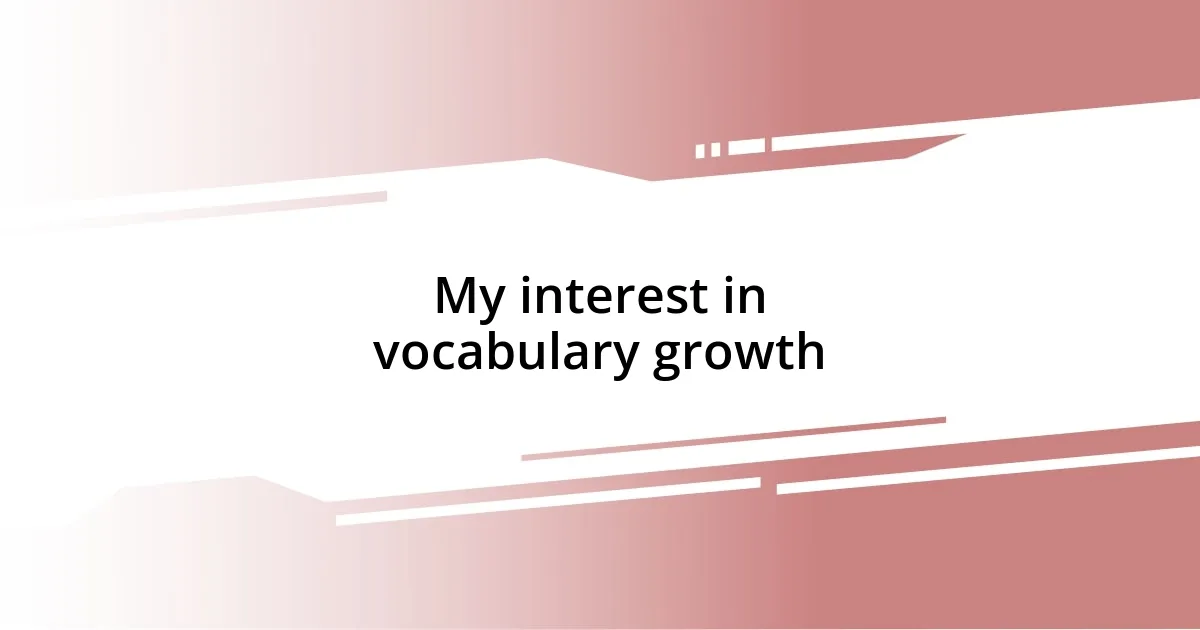
My interest in vocabulary growth
Growing my vocabulary has always been a fascinating journey for me. I remember sitting in a cozy café, only to realize that I couldn’t quite express a thought simply because I lacked the right words. That frustration sparked a deep desire in me to explore language more, turning every new word into a small treasure I could unlock.
There was a particular time when I stumbled upon the word “sonder.” It beautifully encapsulates the realization that everyone has a life as vivid and complex as my own. Discovering such words feels like unearthing little gems hidden in plain sight, don’t you think? Each one I learn adds color to my conversations and enhances my ability to connect with others on a deeper level.
In my experience, vocabulary growth isn’t just about knowing more words—it’s about understanding nuances, emotions, and the stories behind those words. Have you ever felt that rush when you finally find the perfect word to express a feeling you’ve struggled to articulate? That moment of clarity motivates me to keep expanding my vocabulary and, in turn, enrich my understanding of the world and its myriad expressions.
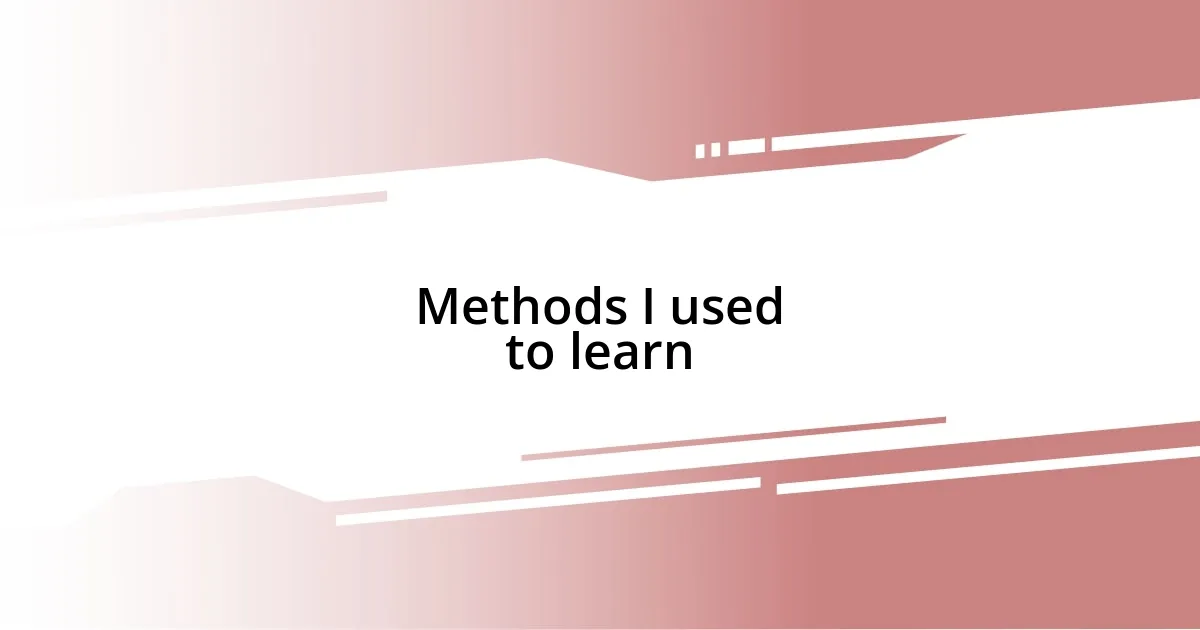
Methods I used to learn
When it comes to expanding my vocabulary, I’ve relied heavily on reading diverse materials. Every book, article, or blog post I dive into reveals not just new words but also their context and usage. I remember one evening, completely absorbed in a novel, I encountered the phrase “ineffable beauty.” The emotion it conveyed was palpable, sparking a desire to deepen my understanding of similar expressions.
Another effective method for me has been to keep a personal journal of new words. Each time I encounter a word that piques my interest, I jot it down, along with its definition and a sentence that uses it. This practice transformed my relationship with language. I recall flipping back through my journal one day and feeling a surge of accomplishment seeing how much I’d grown.
Finally, engaging in conversations with friends who share my passion for language has been truly enriching. We often challenge each other to use new words in sentences, which not only helps cement their meanings but also makes learning exciting. It creates an atmosphere where exploring vocabulary feels like a fun game rather than a chore.
| Method | Description |
|---|---|
| Reading Diverse Materials | Discover new words within context and usage. |
| Personal Journaling | Jot down new words along with meanings and examples. |
| Conversational Engagement | Challenge friends to use new vocabulary, enhancing retention. |
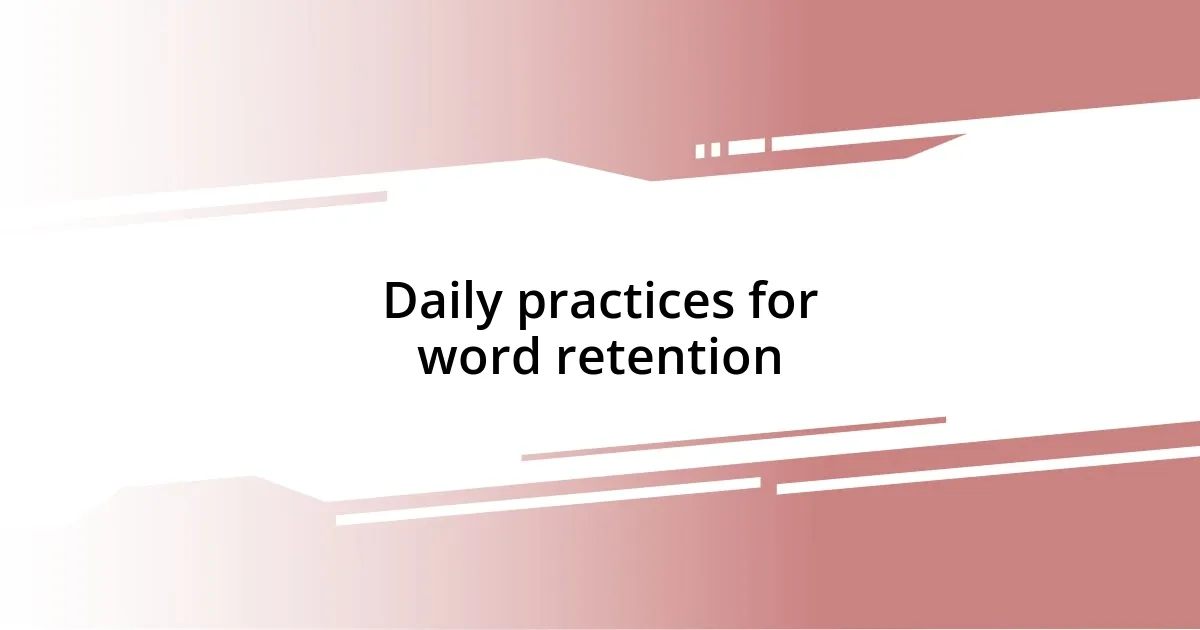
Daily practices for word retention
To effectively retain new words, I’ve found implementing daily practices is crucial. One method I swear by is spaced repetition. I’ll select a handful of new words each week and revisit them at intervals—this helps cement them in my long-term memory. I can still vividly recall a day when I came across the word “petrichor,” which describes the pleasant smell after rain. It struck a chord, and by repeating it throughout the week, it became a part of my everyday vocabulary, vividly bringing to mind the comforting scent of a fresh downpour.
- Spaced Repetition: Revisit words at intervals to enhance long-term retention.
- Word of the Day: Choose a new word each day to use in conversations or writing.
- Flashcards: Create flashcards with definitions and examples to quiz yourself regularly.
Another engaging practice I’ve adopted involves incorporating new vocabulary into my daily routines. I love to label items around my home with their corresponding words, a little trick I picked up to not only remember their meanings but also spark curiosity. Once, when I slapped a sticker with “serendipity” on my fridge, it served as a constant reminder for me to embrace those delightful surprises in daily life. This approach turns my living space into an interactive vocabulary map.
- Labeling: Use sticky notes to label household items with new words.
- Daily Conversations: Make an effort to use new vocabulary in chats with friends or family.
- Creative Writing: Write short stories or poems that incorporate new words, enhancing context and emotional connection.

Using technology for word learning
I’ve discovered that technology has opened new avenues for learning new words, transforming the way I engage with language. Apps like Anki for spaced repetition have become my loyal companions. I remember setting up my study sessions late at night, swiping through flashcards featuring words like “quintessential” or “melancholy.” Each swipe was not only a test of memory but also a pathway to deeper understanding. Isn’t it amazing how a simple app can turn abstract concepts into something so tangible?
Moreover, online platforms such as vocabulary-building websites and podcasts provide an interactive experience. Listening to word-focused episodes has a way of sticking with me, especially when a host whimsically narrates the story behind a word’s origin. I recall tuning into a podcast while cooking, and suddenly, I was enamored by the word “sonder.” The feeling of realizing that everyone around us has their unique, complex lives led me to share this newfound gem with my friends later that evening. It’s incredible how technology can facilitate those “aha” moments.
Lastly, social media can also be a fun tool for word learning. I often follow accounts dedicated to daily vocabulary, where they pair a word with an engaging visual or a clever sentence. This approach helped me finally grasp the word “cacophony.” The first time I saw it paired with a bustling cityscape, it clicked instantly. It made me wonder—how often do we overlook the power of images in enhancing our verbal skills? These digital platforms offer a fusion of creativity and learning, making the process not just educational, but enjoyable.
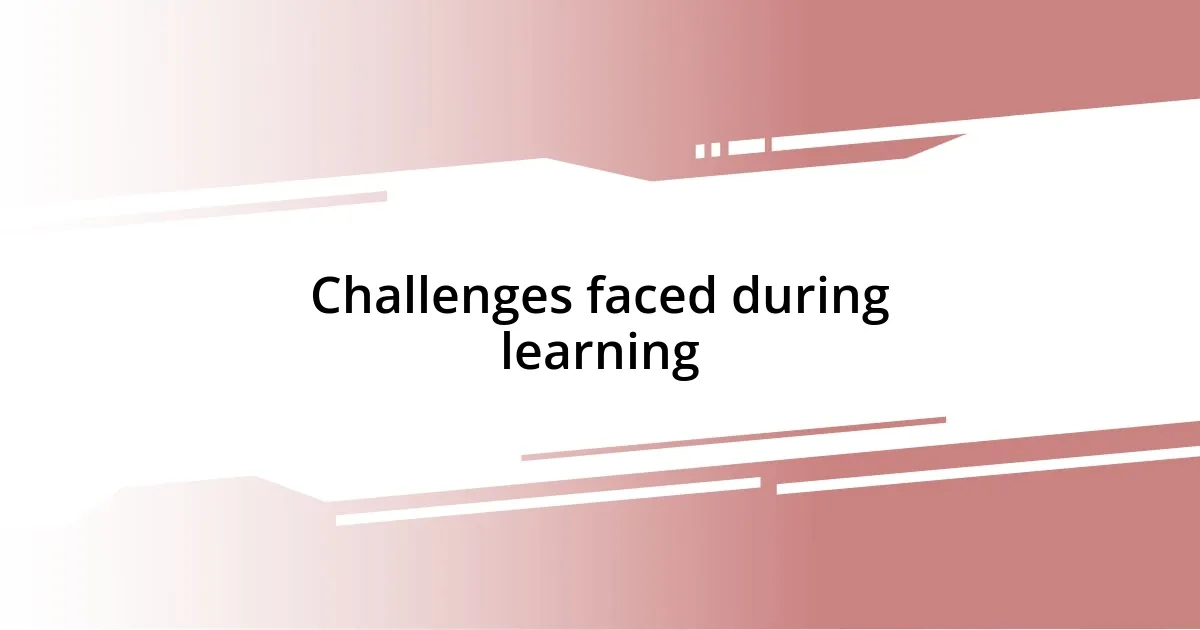
Challenges faced during learning
Learning new words often feels like embarking on a thrilling adventure, but it’s not without its pitfalls. One of the biggest challenges I’ve faced is the overwhelming amount of information to process. Sometimes, I’d come across a mesmerizing word and excitedly try to learn every possible synonym and usage. Yet, I found myself tangled in a web of definitions where clarity drowned in confusion. Have you ever felt like a sponge filled to the brim, struggling to absorb just one more drop? I definitely have, and it can be discouraging.
Another hurdle I’ve encountered is consistent practice. Picture this: it’s a busy weekday, and I’ve just unearthed a beautiful word like “ephemeral.” I can feel the excitement, but then life swoops in with its responsibilities. Days turn into weeks, and suddenly, I can’t recall not just “ephemeral,” but many of the words I once promised to learn. It’s a frustrating cycle. Holding onto new vocabulary while navigating daily life can feel like chasing shadows; I often ask myself how I can turn those shadows into solid forms that stick with me.
Lastly, there’s the inevitable embarrassment that comes with using a newly learned word incorrectly. I remember one particular instance when I confidently dropped “iridescent” into a conversation, only to realize I had misused it. The laughter that followed stung, but it also ignited a determination to get it right next time. I’ve learned that making mistakes is an essential part of the learning process. Isn’t it funny how our blunders can end up being our greatest teachers? Embracing this mindset has helped me push through the awkward moments and keep growing.
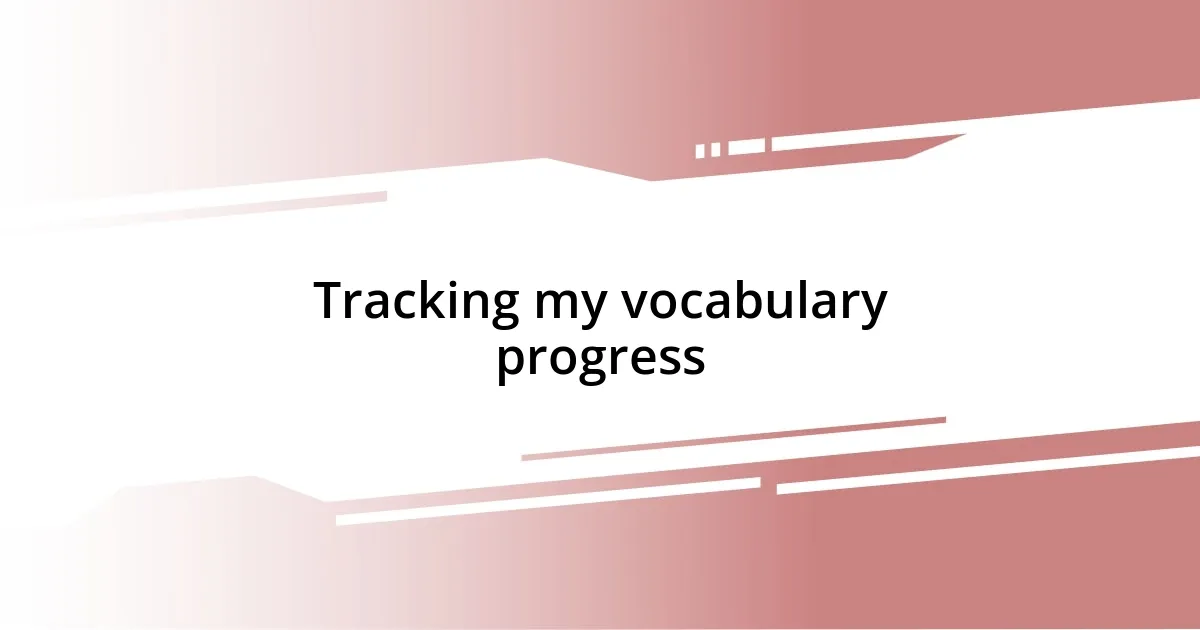
Tracking my vocabulary progress
Tracking my vocabulary progress has been an enlightening experience. I keep a dedicated journal where I jot down new words alongside their meanings and an example sentence. One day, I was reviewing my entries and stumbled upon “verisimilitude”—the way it rolled off my tongue brought back that exhilarating moment of discovery. It hit me: tracking isn’t just about remembering words; it’s about capturing the joy of learning.
I also set goals for myself, like aiming to learn five new words each week. It may sound simple, but hitting that target has become a satisfying routine. I remember a week when I focused on adjectives, and by the end, I casually slipped “effervescent” into a conversation. The surprised look on my friend’s face was priceless. Have you ever had that thrill of using a new word correctly? It’s like a little victory that makes all the effort worthwhile.
Lastly, I take advantage of technology, where I use apps not only for memorization but also for progress tracking. While swiping through flashcards, I can see which words I struggle with and need to revisit. There’s something exhilarating about visualizing growth—like I’m climbing a mountain one word at a time. Isn’t it fascinating how these small milestones can motivate and transform our language journey?

Tips for lifelong vocabulary expansion
Expanding your vocabulary is like planting a garden; it thrives with consistent care. I find that immersing myself in diverse reading materials—novels, articles, and poetry—introduces me to new words in context. One day, while diving into a captivating novel, I encountered the word “sonder.” It encapsulated a feeling I never articulated before, and it sparked a desire to understand its nuances. Have you ever had a word resonate with you so deeply that it felt like a missing piece of your personality? Those moments make learning feel personal, not just academic.
Another strategy I employ is using new words in everyday conversations. I remember cheekily dropping “quixotic” into a discussion about travel plans, even though my friends raised their eyebrows in confusion. It felt a bit audacious, but the joy of expressing an idea so precisely was worth the odd looks. Engaging in dialogue not only reinforces my understanding but boosts my confidence. How often do we shy away from using new vocabulary out of fear? I’ve learned that speaking up, even when unsure, can turn potential embarrassment into empowering moments.
Lastly, I leverage word games and quizzes to make learning enjoyable. For instance, I relish playing Scrabble with friends, where every tile becomes an opportunity to reinforce what I know and discover new terms. I once played against someone who introduced me to “zarf,” a word I had never encountered before. The thrill of competition combined with learning creates an environment that keeps me coming back for more. Have you noticed how playfulness enhances retention? It’s a delightful way to elevate vocabulary without feeling like it’s a chore.

